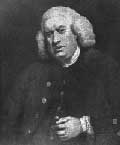New Historicism has called into question our traditional understandings of the literary text's relationship with its historical and cultural context. Typically, we have spoken of situating the text in its attendant circumstances; we have long thought of historical and cultural investigations as providing backdrop and environment for the better understanding of the literary object of study. In this view, the literary text may be thought of as of its moment, but it is predominantly understood as reading that moment, as operating with a perspective on that moment. New Historicism has attempted to turn this traditional understanding on its head. It asks us to see the text as already contained in the cultural and historical context and as in no way standing outside these circumstances. In this view the New Historicism interprets the text not only of its moment, but inescapable of its historical, cultural moment.
How do we ask our students to think of literary texts in this New Historical manner -- as already contained within their context? We might begin to do this by breaking down the distinctions between different genres of objects of study: nonfiction/fiction, historical event/artistic work, culture of the everyday/the transformative moment. To challenge these classificatory dichotomies is to challenge the central dichotomy of old historicism: context and text.
The Dictionary hypertext works to accomplish this. The students' energies are directed toward discovering and discussing links -- key terms and concepts -- that crisscross these binaries. Distinctions between genres and between what are normally thought of as foreground and background weigh less heavily on the students, while their central task becomes attention to and description of sites of interest which they recognize as recurrently energized during the historical moment under question. This is what good cultural studies and New Historicism scholarship often does; the Dictionary hypertext allows students access to this type of scholarly experience and the knowledges it produces.
Related terms:
 Back to the Launch Page
Back to the Launch Page
 Back to the list of keywords
Back to the list of keywords